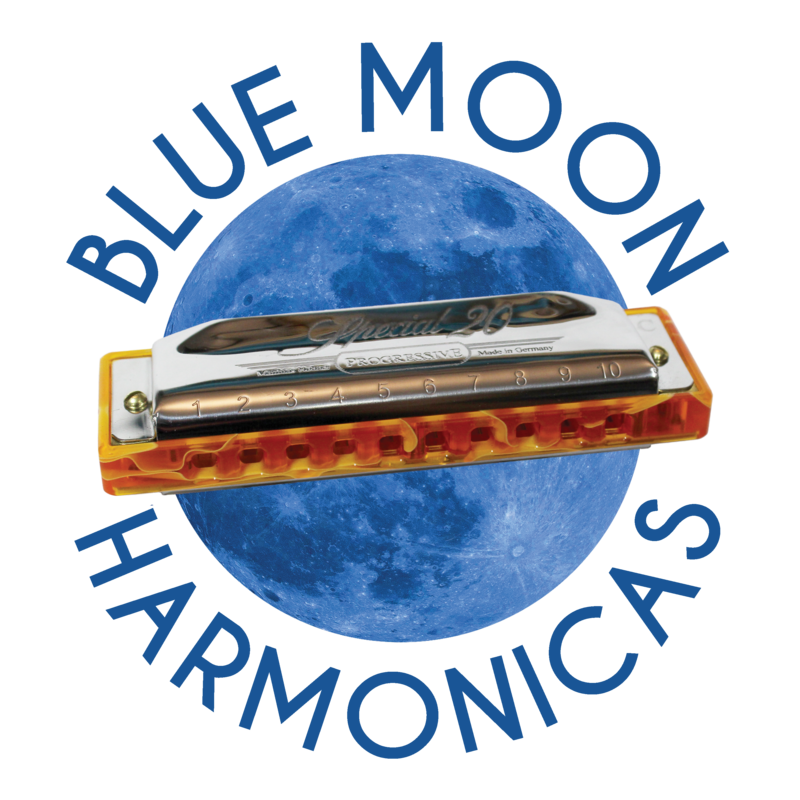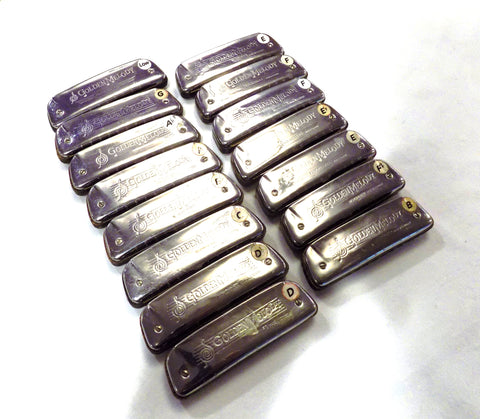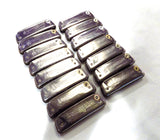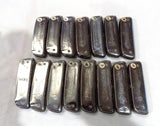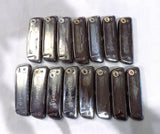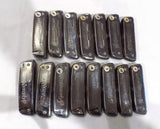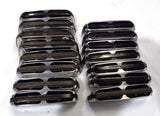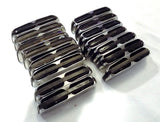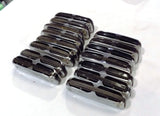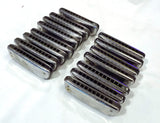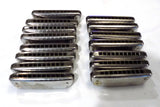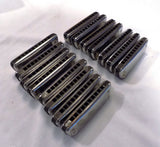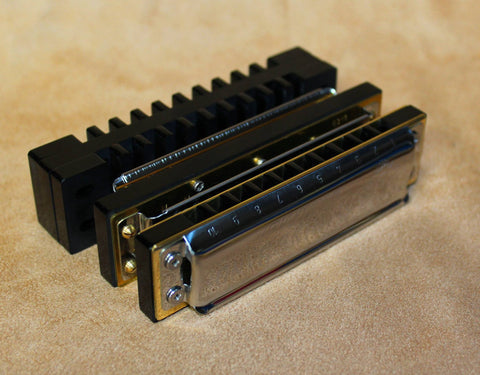John Potts Estate Harps - Joe Spiers Hybrid Golden Melody - Manji Harmonicas
Joe Spiers Hybrid Golden Melody - Manji Harmonicas. This is unique set of Custom Harmonicas built by Joe Spiers in 2012 prior to Joe becoming a Hohner Affiliated Customizer and thereafter working exclusively on Hohner Harmonicas. This set included thirteen harmonicas, including the keys of Low F, Low F#, G, Ab, A, Bb, B, C, Db, D, Eb, E and F. These harmonicas are built using custom Dymondwood combs made by Dick Sjoeberg. The Sjoeberg combs were quite popular up until Mr. Sjoeberg retired. They feature a small cutout or cavity in the dividers between the chambers which purportedly improves the tone and/or responsiveness of the harmonica. I cannot confirm or refute these claims. I can simply say that they are very well made and were quite popular in their time. They are made from Dymondwood, which was a proprietary material that was also widely used by custom comb makers going back 10 years or more. The Dymondwood factory burned down 9 years ago so the supply line has dried up. Consequently, the use of Dymondwood as a comb material has faded away in the past 8-9 years. Joe’s reputation as one of the premier harmonica customizers is well established.
These are the facts. My opinion is as follows. This is a unique set of harmonicas. Golden Melodys with Manji reed plates. A complete set. Thirteen harps in all. Built by one of the top customizers in the world using what was considered premier custom combs at the time. In the interest of full disclosure, there is some wear and tear on these harps. The covers are scratched, and some have dents and dings, but all are functional. Several of the combs could stand to be refinished. Whatever coating (polyurethane or whatever) Mr. Sjoeberg used, has chipped off the backs of several of the combs. If I was the one to purchase this set, I would recondition all the combs. Sand off the original finish and reapply a coat or two of polyurethane. Dymondwood itself is practically indestructible, so these combs would stand up very well to some TLC. I have cleaned and tested every harp. All the reeds play on all the harps. I have removed the covers on each harp in an effort to learn who built them and when. All customizers etch their name, date of build and perhaps some notes on the reed plates of the harps they build. Joe Spiers’s signature and notes are clearly visible. I have not – repeat HAVE NOT – removed the reed plates from the combs for the purpose of cleaning, tuning or adjusting the combs and/or reed plates. I only made sure that all the reeds play and left it at that. I would consider these “project” harps, meaning that potential buyers should be aware that it would be a very good idea to completely disassemble every harmonica and thoroughly clean the reed plates, combs and covers prior to using them. And, as mentioned above, you would be wise to consider refurbishing the combs. Once done, I have little doubt that this would be a fine set of harmonicas. This set of harmonicas probably cost about $2500 new (about $200 per harp). They are 11 years old but have been maintained. Several of the reeds have been replaced, which leads me to believe that they were sent back to Joe when necessary for repair. I think $1500 would be a pretty good price. That is a little more than $100 per harp for Joe Spiers harps.
These are the facts. My opinion is as follows. This is a unique set of harmonicas. Golden Melodys with Manji reed plates. A complete set. Thirteen harps in all. Built by one of the top customizers in the world using what was considered premier custom combs at the time. In the interest of full disclosure, there is some wear and tear on these harps. The covers are scratched, and some have dents and dings, but all are functional. Several of the combs could stand to be refinished. Whatever coating (polyurethane or whatever) Mr. Sjoeberg used, has chipped off the backs of several of the combs. If I was the one to purchase this set, I would recondition all the combs. Sand off the original finish and reapply a coat or two of polyurethane. Dymondwood itself is practically indestructible, so these combs would stand up very well to some TLC. I have cleaned and tested every harp. All the reeds play on all the harps. I have removed the covers on each harp in an effort to learn who built them and when. All customizers etch their name, date of build and perhaps some notes on the reed plates of the harps they build. Joe Spiers’s signature and notes are clearly visible. I have not – repeat HAVE NOT – removed the reed plates from the combs for the purpose of cleaning, tuning or adjusting the combs and/or reed plates. I only made sure that all the reeds play and left it at that. I would consider these “project” harps, meaning that potential buyers should be aware that it would be a very good idea to completely disassemble every harmonica and thoroughly clean the reed plates, combs and covers prior to using them. And, as mentioned above, you would be wise to consider refurbishing the combs. Once done, I have little doubt that this would be a fine set of harmonicas. This set of harmonicas probably cost about $2500 new (about $200 per harp). They are 11 years old but have been maintained. Several of the reeds have been replaced, which leads me to believe that they were sent back to Joe when necessary for repair. I think $1500 would be a pretty good price. That is a little more than $100 per harp for Joe Spiers harps.
We Also Recommend
